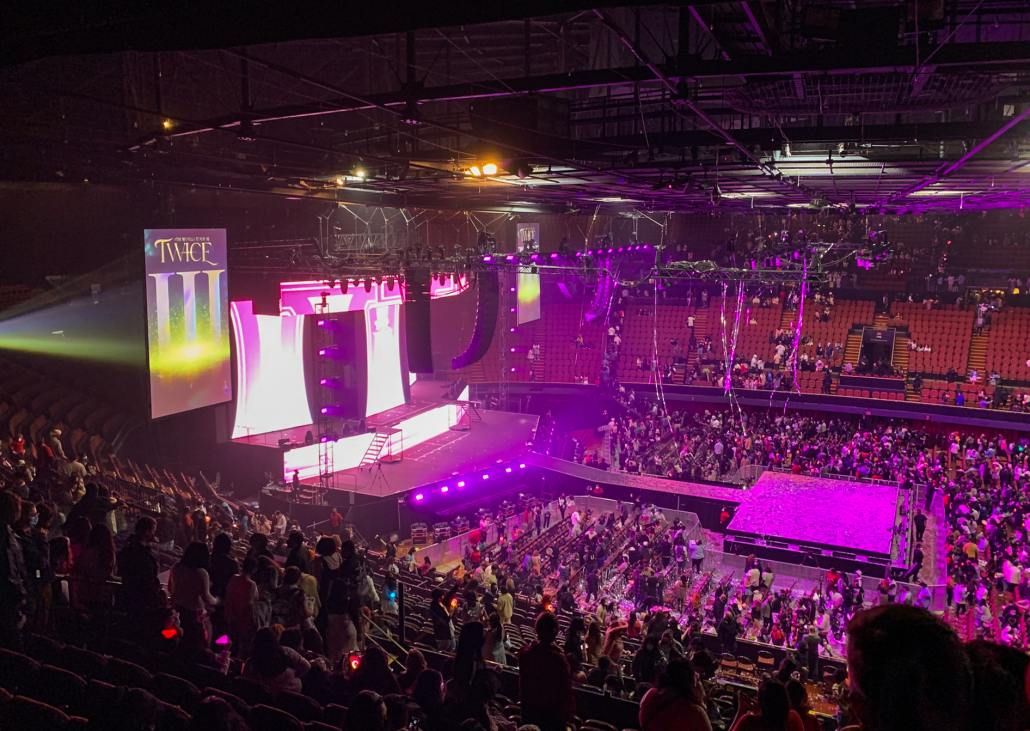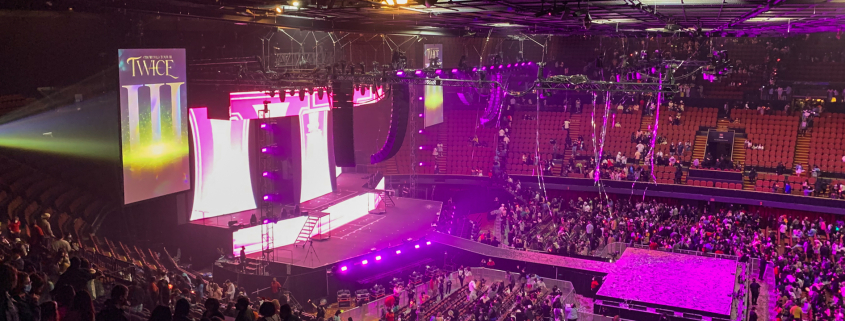Kacie on K-pop: In-person fan events endanger fans and idols

Ever since I became a K-pop fan during my junior year of high school, the genre has always been something I’ve consumed remotely. Given the thousands of miles and hefty time difference separating me from my idols in Seoul, the only possible way for me to support them has been through listening to their music, watching their appearances on variety and reality shows and talking to other fans about them, with the only opportunity in which I can ever engage with them in person being their rare world tours every few years.
So when the pandemic hit, the shift the K-pop industry underwent really wasn’t a large one for me. Throughout the pandemic, as I adjusted to a new reality of Zoom classes, a work-from-home lifestyle and socializing via FaceTime rather than face-to-face, the K-pop industry was forced to adapt as well. Despite no such slowdown in album releases, magazine photoshoots and variety show appearances, the typical ways in which K-pop groups engaged with their fan bases shifted drastically to adapt to a virtual environment.
This shift was welcome for me and many other international fans, as K-pop groups created opportunities for us to interact with our idols in ways that simply didn’t exist before. The creation of livestreaming platform Beyond LIVE, which live broadcasts pay-per-view K-pop concerts and fan meetings globally, brought in-person performances to audiences worldwide. The growing prevalence of online fansign events, which consist of opportunities for fans to enter raffles to participate in video calls with their idols and meant to emulate traditional face-to-face opportunities for fans to meet their idols in person, made talking directly to idols a new reality for fans abroad.
It’s fair to say that these opportunities allowed K-pop companies to — despite the pause that the pandemic put on real life in almost every other aspect — continue profiting off the work of their idols. When Beyond LIVE first launched in April 2020 with SuperM’s virtual concert, more than 75,000 paid viewers tuned in, earning SM Entertainment over $2 million in virtual ticket sales. Additionally, the transition of fansign events to a virtual platform allowed fans even outside of South Korea to also enter raffles, boosting album sales to new heights.
Yet, most importantly, virtual fan engagement opportunities allowed for K-pop companies to continue capitalizing on their idols in a safe way, encouraging social distancing and pushing the message — through their idols — that we’d be able to meet in person again when it was safe to do so.
This begs the question of why, as we come up on the two-year mark since the beginning of a pandemic that is clearly nowhere close to being over, the entirety of the K-pop industry appears to be shifting back toward their prepandemic fan engagement methods. Numerous K-pop groups, including TWICE, Stray Kids and ENHYPEN, have begun holding domestic in-person concerts, fan meetings and fansign events again. Despite mask mandates, testing requirements and other coronavirus-related changes to event policies, the need for K-pop companies to capitalize off in-person events is not only selfish and unnecessary but also extremely dangerous, given the ever-changing circumstances of the pandemic.
This concept becomes even more risky given the industry’s global prevalence and “need” to market abroad, resulting in K-pop groups traveling to the United States for cross-country concert tours — moves I’d assume are fueled by America’s lack of a government-mandated quarantine requirement that allows for multiple concert dates in a relatively short amount of time. Following BTS’ sold-out Permission to Dance On Stage concert at Inglewood’s SoFi Stadium last November, a number of other K-pop groups quickly followed suit, booking venues and announcing American tours, despite rising case numbers due to the omicron variant both in the U.S. and South Korea.
As a fan, I definitely get it — I’ve missed my K-pop boys just as much as the next fan and would jump at the opportunity to see them in person as soon as physically possible. In fact, I too went to BTS’ concert in November and had the time of my life there. Yet, a part of me can’t help but question the public health implications behind these concerts happening again so quickly.
The problem itself is twofold: With companies sending their idols abroad for these American concerts, they not only risk the health of their idols — for example, VERIVERY’s Yongseung tested positive for coronavirus in the middle of its U.S. tour last December, resulting in the cancelation of their remaining concert dates — but also the health of their idols’ fans. Because of how rarely an international fan’s favorite idol visits their city, it becomes easy to justify attending their concert despite feeling even the tiniest bit under the weather. Additionally, with the limited stops most of these tours have, it’s not uncommon for fans from surrounding towns, cities and states to travel unnecessarily to attend these shows, promoting even more coronavirus spread. This presents countless risks to public health, risks that are unneeded and all clearly preventable.
While it’s certainly up to the individual if they’d like to take the risk of contracting coronavirus at an in-person K-pop event, companies should be held accountable for the reckless behavior they’re promoting by sending their idols abroad on these tours in the first place. If these companies still made millions of dollars through coronavirus-compliant virtual events in South Korea, what’s the harm in continuing to do so until the risk of performing abroad decreases as well?
To these K-pop companies, I just have one question: What exactly is the harm in protecting the idols and fans that are making you all this money in the first place?
Kacie Yamamoto is a junior writing about Korean pop music. She is also an associate managing editor at the Daily Trojan. Her column “Kacie on K-pop” runs every other Thursday.

